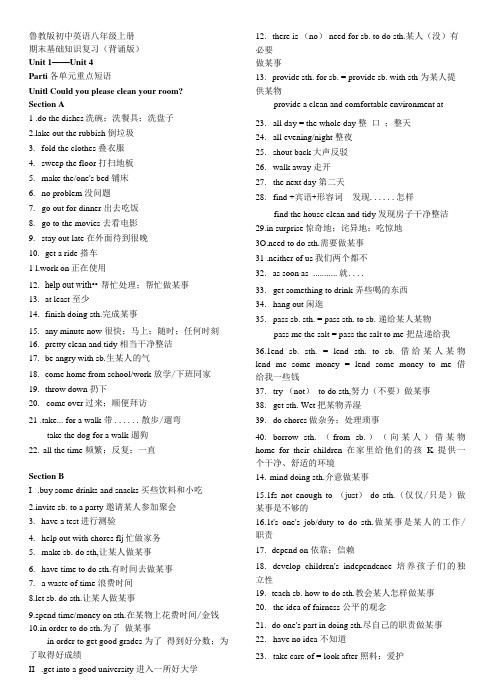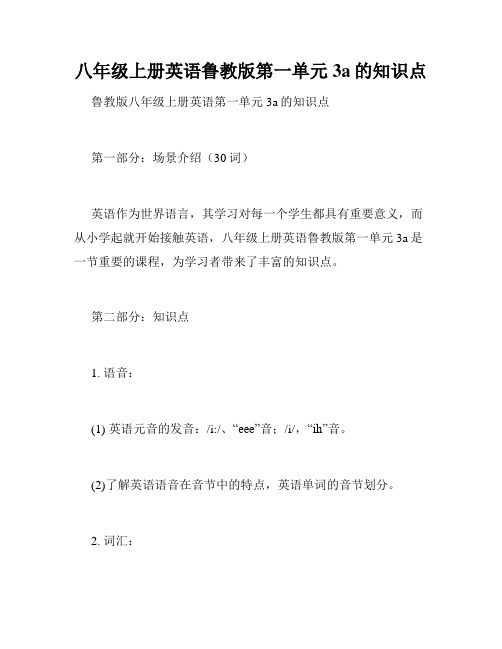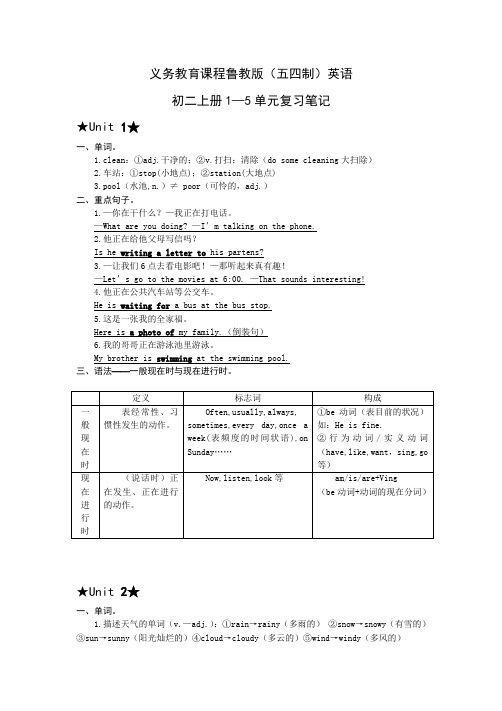八年级英语鲁教版重点知识整理
鲁教版英语初二全部复习提纲

初二Unit 1-3 复习提纲Words:1.sure: be sure to do sth.2.wait: wait for sb./the bus; wait for sb. to do sth.3.表示天气的形容词:wind/rain/cloud/snow+y (sun+ny);两对反义词:cold/hot cool/warm ;humid (weather,wind, rain, snow, cloud等天气名词不可数)4.lie(躺):过去式:lay 现在分词:lying5.surprised: be surprised to do sth./ be surprised at sth.6.relaxed: 动词:relax7.季节:winter; summer (in winter)8.height: the height of…形容词:high(区别于tall)9.popular: be popular with10.always 否定词:never11.stop: stop to do sth. /stop doing sth.12.remember: remember to do sth.Phrases1.打电话:talk on the phone2.与某人谈论某事talk about sth. with sb.3.在第一张照片中in the first photo4.用照相机照相take photos(a photo) with a camera5.让某人做某事let sb. do sth.6.度假on vacation7.一些。
另一些some… others..8.在这样的热天里in this heat9.玩的愉快have fun=have a good time= enjoy oneself10.为做…而感谢thanks for doing sth.11.听起来不错That sounds good./great或Sounds great!12.留短发/卷/长/直发have short/ curly / long /straight hair13.中等个头medium height 中等体形medium build14.带眼镜wear glasses15.篮球队长the captain of the basket team16.有点安静a little bit(a little/a bit/kind of) quiet17.喜欢开玩笑love to tell jokes18.留胡子have a beard19.我最喜欢的音乐家my favorite musician20.戴滑稽眼镜的流行歌手the pop singer with funny glassesSentences&grammar: .1.现在进行时:1)用法:表示说话时正在进行的动作或发生的事情。
期末总复习Unit1基础知识篇 鲁教版英语八年级上册

鲁教版初中英语八年级上册期末基础知识复习(背诵版)Unit 1——Unit 4Parti各单元重点短语Unitl Could you please clean your room?Section A1 .do the dishes洗碗;洗餐具;洗盘子ke out the rubbish 倒垃圾3.fold the clothes 叠衣服4.sweep the floor 打扫地板5.make the/one's bed 铺床6.no problem 没问题7.go out for dinner 出去吃饭8.go to the movies 去看电影9.stay out late在外面待到很晚10.get a ride 搭车1 l.work on正在使用12.help out with••-帮忙处理;帮忙做某事13.at least 至少14.finish doing sth.完成某事15.any minute now 很快;马上;随时;任何时刻16.pretty clean and tidy 相当干净整洁17.be angry with sb.生某人的气e home from school/work 放学/下班同家19.throw down 扔下e over过来;顺便拜访21 .take... for a walk 带...... 散步/遛弯take the dog for a walk 遛狗22.all the time 频繁;反复;一直Section BI.buy some drinks and snacks 买些饮料和小吃2.invite sb. to a party 邀请某人参加聚会3.have a test进行测验4.help out with chores flj忙做家务5.make sb. do sth,让某人做某事6.have time to do sth.有时间去做某事7. a waste of time 浪费时间8.let sb. do sth.让某人做某事9.spend time/money on sth.在某物上花费时间/金钱10.in order to do sth.为了做某事in order to get good grades 为了得到好分数;为了取得好成绩II.get into a good university 进入一所好大学12.there is (no) need for sb. to do sth.某人(没)有必要做某事13.provide sth. for sb. = provide sb. with sth 为某人提供某物provide a clean and comfortable environment at23.all day = the whole day 整口;整天24.all evening/night 整夜25.shout back大声反驳26.walk away 走开27.the next day 第二天28.find +宾语+形容词发现......怎样find the house clean and tidy 发现房子干净整洁29.in surprise惊奇地;诧异地;吃惊地3O.need to do sth.需要做某事31 .neither of us我们两个都不32.as soon as ........... 就....33.get something to drink 弄些喝的东西34.hang out 闲逛35.pass sb. sth. = pass sth. to sb. 递给某人某物pass me the salt = pass the salt to me 把盐递给我36.1end sb. sth. = lend sth. to sb. 借给某人某物lend me some money = lend some money to me 借给我一些钱37.try (not)to do sth,努力(不要)做某事38.get sth. Wet把某物弄湿39.do chores做杂务;处理琐事40.borrow sth. (from sb.)(向某人)借某物home for their children 在家里给他们的孩K提供一个干净、舒适的环境14.mind doing sth.介意做某事15.1fs not enough to (just)do sth.(仅仅/只是)做某事是不够的16.1t's one's job/duty to do sth.做某事是某人的工作/ 职责17.depend on 依靠;信赖18.develop children's independence 培养孩子们的独立性19.teach sb. how to do sth.教会某人怎样做某事20.the idea of fairness 公平的观念21. do one's part in doing sth.尽自己的职责做某事22.have no idea 不知道23.take care of = look after 照料;爱护24.as a result 结果25.fall ill/sick 生病26.the earlier…,the better*•• ..... 越早, ... 越好27.learn how to do sth.学会怎样做某事Part II重点句子Section A1 .Could I at least finish watching this show?(教材P2)至少让我看完这个节目行吗?2.Could you take out the rubbish, fold the clothes and do die dishes?(教材P2)你可以倒垃圾、叠衣服、洗餐具吗?3.She won't be happy if she sees this mess.(教材P2)如果她看到这么乱,她会不高兴的。
鲁教版英语(五四制)八年级上册_Unit4_单元知识汇总

Unit4 单元知识汇总【单词归纳】1. weak adj. 虚弱的,无力的be weak in 在某方面薄弱反义词strong2. god n. 神,上帝goddess 女神3. remind v. 提醒,使想起remind sb. + that/what 从句Would you please remind him that our meeting has been put off?remind sb. to do 提醒某人做某事Please remind me to post the letter.remind sb. of/about sth.使某人想起某事,使想起I want to remind you of the school rules.4. bit n. 一点,小块a bit 一点儿,同义短语a little,a little bit后接形容词,副词a bit of +不可数名词一点儿……;同义短语a little5. magic n. 魔术magician n. 魔术师6. excite v. 使激动;使兴奋;excitement n. 兴奋;exciting /excited adj. 令人兴奋的/兴奋的7.Western adj. 西方国家的western adj. 西方的;方位+ern 构成形容词:eastern东方的;northern 北方的southern 南方的8. prince n. 王子princess n. 公主9. fit v. 适合;合身fit (sb.) well fit adj.健康的,强健的keep fitfit. 适宜的be fit to do 适宜做某事be fit for sth. 适合…….10.marry v. 结婚marry sb. 嫁给某人,与某人结婚be/get married to sb. 与某人结婚;marriage n. 婚姻11. gold n. 金子,金币/ adj. 金色的golden adj.金(黄)色的二. 重点短语1. work on doing sth. 致力于做某事2. as soon as ...... 一……就…….3. once upon a time 从前4. continue to do sth. 继续做某事5. make sth. happen 使某事发生6.try to do sth. 试图做某事7. the journey to sp. ……之旅8. tell the/a story 讲故事9. put on 穿上10. a little bit 有点儿11. keep doing sth. 坚持做某事12. give up 放弃13. instead of 代替;反而14. turn .. . into... 变成……15. get married 结婚16. the main character 主要人物;主人公17. at other times 在另外一些时候18. be able to 能;会19. come out (书、电影等)出版20. become interested in. 对……感兴趣21. walk to the other side 走到另一边去22. a fairy tale 一个神话故事23. the rest of the story 故事的其余部分24. leave sb. to do sth. 让某人做某事25. make a plan to do sth. 筹划/计划做某事26. go to sleep 去睡觉27. lead sb. to sp. 把某人领到某地28. get lost 迷路29. change one’s plan 改变计划30. tell sb. to do sth. 叫某人做某事31. in the moonlight 在月光下32. find one’ s way home 找到某人回家的路33. the next day 第二天34. send sb. to sp. 派某人去某地【语法专项】1. unless 引导条件状语从句unless 是连词,意为“除非,如果不”,unless引导的条件状语从句,同if... not。
八年级鲁教下册英语知识点

八年级鲁教下册英语知识点在八年级学习英语需要掌握下册的一些知识点,下面将为大家介绍这些知识点。
一、词性转换英语中有许多词汇需要进行词性转换,如形容词变为副词、动词变为名词等。
在学习过程中,需要掌握这些词性转换的规则,以便更好地应用词汇。
例如:形容词变为副词:fast - quickly, good - well, happy - happily动词变为名词:write - writer, sing - singer, swim - swimmer二、介词的用法介词是连接名词、代词或动词与其他词语的一种词汇。
在英语中,介词的使用非常复杂,需要熟练掌握各个介词的用法,以便正确使用。
例如:at:表示时间点,如at 7 o’clock;表示地点,在房子里,如at home。
on:表示时间,如on Monday;表示表面,如on the table。
in:表示时间段,如in the morning;表示地点,在城市中,如in Beijing。
三、情态动词情态动词是一类特殊的动词,通常用来表示一种态度、可能性或义务。
在英语中,情态动词的使用非常普遍,需要掌握其用法,以便更好地表达自己的意思。
例如:can:表示能力,“我会游泳”可以翻译为“I can swim”。
may:表示可能性,“明天可能下雨”可以翻译为“It may rain tomorrow”。
must:表示义务,“你必须完成作业”可以翻译为“You must finish your homework”。
四、时态英语中共有十二种时态,其中最基本的包括现在时、过去时和将来时。
在学习过程中,需要掌握各个时态的构成和用法,以便正确使用。
例如:现在时:表示当前的动作或状态,如“I am reading a book”。
过去时:表示过去发生的动作或状态,如“I played basketball yesterday”。
将来时:表示将要发生的动作或事件,如“I will go to the movies tomorrow”。
鲁教版八年级英语下册的重点词汇汇总

鲁教版八年级英语下册的重点词汇汇总Unit 1: Can you play the guitar?•ability•classical•instrument•perform•skill•tuneUnit 2: What’s the matter?•appointment•bandage•bleed•cough•flu•soreUnit 3: Why don’t you talk to your parents?•advice•argue•calm•embarrassed•nervous•upsetUnit 4: Have you ever been to a museum?•ancient•exhibition•fossil•masterpiece•sculpture•statueUnit 5: Do you want to watch a game show?•challenge•compete•contestant•host•opponent•refereeUnit 6: I’m going to study computer science.•analyze•application•hardware•software•system•technologyUnit 7: Where would you like to visit?•beach•castle•forest•mountain•scenery•sightseeingUnit 8: Have you read Treasure Island yet?•adventure•character•plot•setting•suspense•themeUnit 9: How was your weekend?•celebrate•community•festival•tradition•unique•volunteerUnit 10: How do you feel about going to school?•boring•challenging•enroll•extracurricular•motivate•passionateUnit 11: What are you going to do for your birthday?•blow out•celebrate•decorate•present•surprise•wishUnit 12: What’s the best way to travel?•budget•destination•itinerary•luggage•souvenir•vacation以上是鲁教版八年级英语下册的重点词汇汇总,共计72个词汇。
鲁教版八年级上知识点梳理

鲁教版八年级上知识点梳理第一单元一、知识点拓展:1. use: be used for be used by be used to doIt’s no use trying to keep him in bed.2. less, more, fewer的用法3. college: go to college at college: 在学校,相对应于“在家里,在校外”,in college: 在上大学,相对应于“有工作”。
4. there be与have的用法5. a few, few, a little与little的用法6. live to be +年龄:活到……岁。
She lived to be a hundred.7. free:空闲的,自由的;免费的。
8. space:太空,一般不用冠词,但被形容词修饰时可用the. in the dark space9. fly to=go t o……by air10. fall:落下,跌落fall off =fall down from, fall behind 落后:He fell off his bike and broke his leg.to become:变为: Has he fallen ill again?11. probably: = perhaps=maybe, probable12. even: even if/though:即使,纵然13. fall in love with:爱上……,与……谈恋爱(动态)be in love with sb:热恋着某人;喜爱某物(静态)have a love of/for sth:爱好某事(静态)He has a great love for sports.14. go skating: go+ v. ing结构:表示进行体育和业余活动。
go fishing go boating go hiking go shopping15. alone与lonely: alone adj﹠adv单独,独自一人,是形容词时,只作表语,是副词时,作状语。
八年级上册英语鲁教版第一单元3a的知识点

八年级上册英语鲁教版第一单元3a的知识点鲁教版八年级上册英语第一单元3a的知识点第一部分:场景介绍(30词)英语作为世界语言,其学习对每一个学生都具有重要意义,而从小学起就开始接触英语,八年级上册英语鲁教版第一单元3a是一节重要的课程,为学习者带来了丰富的知识点。
第二部分:知识点1. 语音:(1) 英语元音的发音:/i:/、“eee”音;/i/,“ih”音。
(2)了解英语语音在音节中的特点,英语单词的音节划分。
2. 词汇:(1) 学会并能够正确拼写以下关于人的词汇:clerk, engineer, manager, actor, singer。
(2) 学会常用的六个颜色:blue, green, yellow, black, white, red。
(3) 掌握关于“职业”和“颜色”的常见表述形式。
3. 语法:(1) 学会简单的预测句。
(2) 了解人称代词 he, she, it 的用法。
4. 交际:(1) 学习询问他人的职业。
(2) 学会表述自己的职业。
(3) 掌握介绍他人的方法和语言表述。
第三部分:学习建议学习英语要注重听说读写并重,通过不断地练习,掌握好每一个知识点,从而更好地发挥语言交际的能力。
在学习过程中,多进行听说练习,并注重写作和口语表达,让自己在日常交流中能流利地使用英语。
同时,要多接触原汁原味的英语,如看英文电影、听英文歌曲、读英文小说等,不断适应英语的语感和表达方式,提高对英语的运用能力。
总结:英语作为世界语言,具有重要的地位,并且学习者在学习英语时,需要注重语音、词汇、语法以及交际方面的学习。
通过不断地练习和适当的英语输入,进一步提高语言的使用能力,并更好地发挥英语在日常交流中的作用。
鲁教版初二上册英语复习笔记

义务教育课程鲁教版(五四制)英语初二上册1—5单元复习笔记★Unit 1★一、单词。
1.clean:①adj.干净的;②v.打扫;清除(do some cleaning大扫除)2.车站:①stop(小地点);②station(大地点)3.pool(水池,n.)≠ poor(可怜的,adj.)二、重点句子。
1.—你在干什么?—我正在打电话。
—What are you doing? —I’m talking on the phone.2.他正在给他父母写信吗?Is he writing a letter to his partens?3.—让我们6点去看电影吧!—那听起来真有趣!—Let’s go to the movies at 6:00. —That sounds interesting!4.他正在公共汽车站等公交车。
He is waiting for a bus at the bus stop.5.这是一张我的全家福。
Here is a photo of my family.(倒装句)6.我的哥哥正在游泳池里游泳。
My brother is swimming at the swimming pool.三、语法——一般现在时与现在进行时。
定义标志词构成一般现在时表经常性、习惯性发生的动作。
Often,usually,always,sometimes,every day,once aweek(表频度的时间状语),onSunday……①be动词(表目前的状况)如:He is fine.②行为动词/实义动词(have,like,want,sing,go等)现在进行时(说话时)正在发生、正在进行的动作。
Now,listen,look等am/is/are+Ving(be动词+动词的现在分词)★Unit 2★一、单词。
1.描述天气的单词(v.—adj.):①rain→rainy(多雨的)②snow→snowy(有雪的)③sun→sunny(阳光灿烂的)④cloud→cloudy(多云的)⑤wind→windy(多风的)2.weather(天气)≠ whether(是否)3.pretty:①adv.相当(pretty good);②adj.漂亮的4.lie的现在分词是lying(躺).5.heat:①(n.)热度;②(v.)加热。
- 1、下载文档前请自行甄别文档内容的完整性,平台不提供额外的编辑、内容补充、找答案等附加服务。
- 2、"仅部分预览"的文档,不可在线预览部分如存在完整性等问题,可反馈申请退款(可完整预览的文档不适用该条件!)。
- 3、如文档侵犯您的权益,请联系客服反馈,我们会尽快为您处理(人工客服工作时间:9:00-18:30)。
八年级英语鲁教版重点知识整理短语:1、yard sale 现场出售,院子买卖2、check out 检查check up 检查,清理3、look through 看穿;仔细检查;穿过…看;对(某人)视而不见look up 向上看;查找;改善;拜访look for 寻找look after 照顾,照料,料理4、say goodbye to sb 道别see you againI'll be seeing you.;So long.5、no longer 不再,已不not any moreno morenot any longer6、part with 失去,卖掉,与…分割开7、as for 至于;关于8、to be honest 说实话(to)tell the truth9、clear out 清除;离开;洗劫一空10、be back to 回来,放回depart from 离开11、one of ……中的一个12、be away 离开,出发13、be full of 充满14、run around 东奔西跑look around 四周环顾around the world 全世界around three hours 大约三小时15、hundreds of 数以百计的16、close to 离…近,与…关系亲密17、for/since 区别(1)since 的四种用法①、since + 过去一个时间点(如具体的年、月、日期、钟点、ago. 1990 , last month ,half past sixI have been here since 1990. 1990起,我一直在这儿。
②、since+ 一段时间+agoI h a v e b e e n h e r e s i n c e f i v e m o n t h s a g o。
自从五个月前,我已经在这儿了。
③、since+从句GreatChangeshave taken place since you left. 自从你走后,已经发生了很大的变化。
④、It is +一段时间+since从句I t i s t w o y e a r s s i n c e I b e c a m e a n E n g l i s h t e a c h e r.我成为英语老师有两年了。
(2、)Since 和for区别①、Since +时间点,具体时间“自从、、、、以来,从、、、以后” 用来说明动作起始时间I have been in Beijing since 2010.②、For + 时间段,用来说明动作延续时间长度,因此句中的谓语动词,也应该是延续性动词。
I have been in Beijing for one year。
We have learnt English for about three years.I have been here for 3 days. (对)I have arrived here for 3 days.(误)6、18、either; too; also; as well 的区别(1)、as well常用作状语,作“又;也”解,相当于too或also,常位于句末,无须用逗号与句子分开.如:I am going to London and my sister is going as well(=going,too). (2)、as well 可以直接用于just后,用作应答语(可视为It's just as well、的省略),作“幸亏,幸而;无妨;没关系”解.如:—We were too late to see the film.—Just as well、I hear it isn't very good.(3)、also,either与too三者都是“也”的意思,also ,too 用于肯定句,其中also 用于句中,too用于句尾,且前面有逗号;either用于否定句,且前面有逗号。
例如:His father is a doctor; his mother is also a doctor.His father is a doctor; his mother is a doctor, too.His father isn't a doctor; his mother isn't a doctor, either.句型:1、How long have you had that bike?2、I’ve had it for three years.3、Have you ever played football?4、Yes, I did when I was little.5、As they get bigger our house seems to get smaller.[来源:学科网6、Have done...since...7、How long has it been there?8、It has been there for…/since…/as long as…9、find much time to do sth10、It’s a shame that…11、According to…12、regard…with…13、It’s such a …14、have ever been to…15、have never been to…16、have gone to…17、It’s unbelievable that…18、encourage sb to do…语法:过去完成时1、概念:表示某个动作或状态发生在过去,但对现在造成了影响,这个动作或状态也可能已经结束,也可能还要继续下去。
2、现在完成时态的构成:助动词have / has +动词的过去分词。
当主语为第三人称单数用has,其余人称用have。
否定句在助动词have/ has 后加not ;疑问句则把助动词Have/ Has 提放到主语之前。
如:I have worked here for ten years .She hasn't been to the Great Wall .Have you been to Beijing ?3、现在完成时态的用法(1)、表示过去某时刻发生的动作对现在造成的影响或结果,常与already, yet, just , ever, never…..before, this morning, now , today , so far , in the last/ past+时间段、over +时间段, recently,by+现在时间等连用如:Tom has already finished his homework.We have had two classes this morning.(2)、表示从过去某一时刻开始,一直延续到现在的动作或状态,常与for 引导的一段时间或since 引导的时间点或过去时间状语从句连用。
如:Mr Green has lived in China for five months.Mr Green has lived in China since five months ago.Mr Green has lived in China since he came to China.4、have/ has been to 与have/ has gone to 区别(1)、have/ has been to 表曾去过某地(现在已不在该地),其后可接表次数的时间名词。
如:Have they been to E'mei Mountain?(2)、have/ has gone to 表示去某地了(现在不在说话的现场),其后不能用任何时间名词。
如:Where is Jim ? He has gone to the library.(3)、have/ has been in /at表曾在某地住过、停留过,其后常跟for 或since 引导的时间状语。
如:I have been at that village for ten years.5、短暂性动词与延续性动词在完成时态中的运用(1)、在肯定句中,不能和for,since引导的时间状语连用,也不能用在how long 引起的特殊疑问句中。
(2). 凡是"完成时态"都表示,不知道也不管动作发生的具体时间, 所以在使用现在完成时的句子里,不可以带有表示具体过去时间的状语,如:yesterday , last week ( month , year , etc. ) , two weeks ago , in 1999等;但常和有些副词连用,如: just , before , already , often , never , ever , not…yet , always等等。
(3). 在以when提问的特殊疑问中不能用现在完成时。
另外,ago不能用于现在完成时的句子里,因为它表示从现在算起的以前某个时间,属于表示具体过去时间的状语。
但是可以用before 来表示"以前"的意义,因为它只表示"以前",而不知什么时候的以前。
(4)、大部分短暂性动词可以根据实际情况改为相应的延续性动词来表达相同或相近的意思,常用的列举如下:borrow /lend→keep buy →have leave →be away( from) die →be deadjoin →be in / be a member ofget to know →know begin →be oncome →be / live / stay put on →wear catch a cold →have a coldget/go to sleep/ fall asleep →sleep, be asleep get up / wake up →be upgo to school →be at school get/ receive (接收)→havehear from →have a letter from finish →be overgo / come / arrive /get(到达)/reach →be(in/at)(5)、句型1:It is / has been +时间段+since +句子(过去时态)It is five years since he came to China.句型2:It’s [will be] the first time that…(第一次…):It’s the first time I’ve come here. 这是我第一次来这儿。
